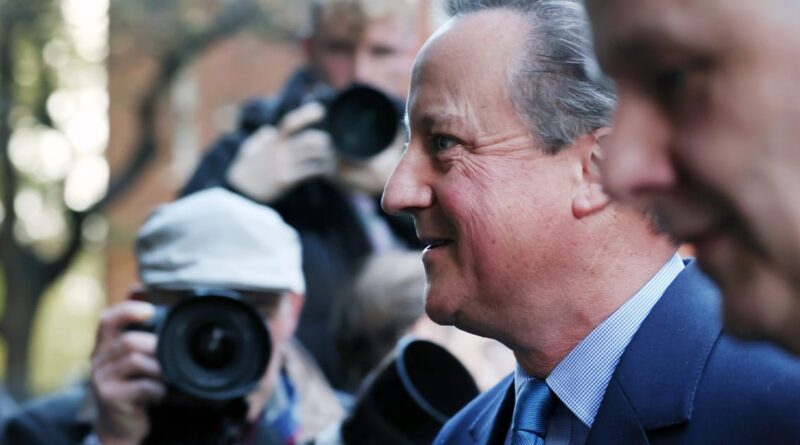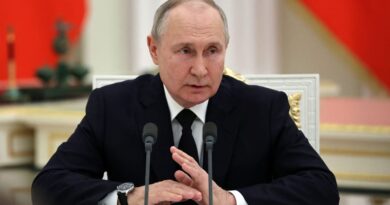David Cameron’s shock return divides UK Tories
Press play to listen to this article
Voiced by artificial intelligence.
LONDON — David Cameron’s astonishing, global-headline-grabbing comeback has already divided the Conservative Party.
In a surprise appointment Monday, Cameron, who served as prime minister of the U.K. between 2010 and 2016, was made foreign secretary in Rishi Sunak’s Tory government.
It was the biggest development in a major ministerial reshuffle that saw Sunak sack right-wing firebrand Suella Braverman as home secretary and appoint many of his closest allies to top jobs.
Cameron, who resigned after losing the Brexit referendum in 2016, becomes the U.K.’s top diplomat. He has been handed a seat in the unelected House of Lords to allow him to take the job.
From Cameron’s perspective, leading the foreign office has obvious appeal as an opportunity to rebuild his battered reputation after having triggered a Brexit referendum that he lost, and facing stinging criticism of his post-government lobbying work.
But Sunak’s decision to bring him back in from the cold has provoked sharp disagreement in a Conservative Party which, on current polling, is destined for electoral defeat.
Dividing opinion
POLITICO spoke to more than half a dozen Tory MPs and ministers who welcomed Cameron’s return. Most, but not all, were from the left and center wings of the Conservatives. Some were granted anonymity to speak freely about the state of the governing party.
“Hurrah!” said a former minister. “The acknowledgment that we fight elections from the center ground is basic but great news.” A Tory MP elected in 2019 said “this may actually turn out to be a masterstroke” by Sunak, and heralded “a return to the sensible middle ground.”
Another 2019 Tory MP said: “I’m to the right of DC but I have missed his calibre in government … The naysayers forget that he brought a lot of us to the Conservative Party in our younger years. Rishi has pulled a blinder.”
As Conservative leader, Cameron helped drag his party back from years in the political wilderness.
He modernized its image, diversified the intake of its parliamentary representatives, and negotiated a once-implausible coalition with the center-left Liberal Democrats in 2010 to end years of Labour rule. He also saw off a Scottish referendum fight in 2014, and then won a sizable election victory in 2015 — when many pundits predicted a hung parliament.
Richard Graham, MP for Gloucester and a trade envoy to east Asia, said Cameron’s was a strong appointment because of his “depth of experience and natural temperament.”
A former cabinet minister echoed this, saying the move would “reassure the party and public that the Conservatives are serious about governing and winning.”
Tory MPs in southern English seats, meanwhile, hope that Cameron’s return will prove popular with their voters in the next election. In many of these seats, the party faces a strong challenge to the left from the Lib Dems.
Courting controversy
But the appointment has already riled some MPs on the right of the party — who suspect a leftward shift in Sunak’s government. A Tory MP who is allied with Braverman said they were concerned over “what it signifies about [the] direction of travel.”
Cameron also brings plenty of baggage. Some in Westminster argue that controversy over his activities since leaving office may lead Sunak to regret bringing him back to the frontline.
The former PM was at the center of the Greensill scandal, one of the biggest lobbying rows in recent British political history. A parliamentary committee found in 2021 that Cameron had shown a “significant lack of judgement” in lobbying the British government on behalf of finance firm Greensill Capital, which hired him as a paid adviser before it collapsed amid questions over the way it was run. The Serious Fraud Office’s investigation into the firm is ongoing.
Labour strategists in parliament on Monday cited Greensill in claiming the appointment of Cameron will ultimately harm the Tories. “It’s great for us — and plays perfectly into our attacks [on] about 13 years of Tory government,” said a senior Labour official, granted anonymity to discuss strategy. “They’ll live to regret it, I’m sure.”
“That’s all fair game now,” they said of Greensill. Asked about the controversy on Monday afternoon, Cameron told broadcasters: “As far as I’m concerned, that is all dealt with and in the past.”
Tory MPs who have been sanctioned by Beijing for criticizing its human rights record are also concerned about what Cameron’s appointment means for the U.K.’s approach toward China.
As prime minister, Cameron heralded a “golden era” in relations with Beijing — and even hosted President Xi Jinping for a state visit.
On leaving office, Cameron became vice-chair of a U.K.-China investment fund. POLITICO previously reported that as recently as September he had travelled to Sri Lanka to drum up investment in a controversial Chinese-built port city in Colombo.
Former Tory leader Iain Duncan Smith said: “Those of us who are sanctioned by China and face attacks online day after day are astonished at the signal this sends. It suggests that Sunak is intent on doing business with China at all costs and that the regime’s appalling murderous behavior will be pushed into the background.”
International response
Cameron’s appointment to head British diplomacy has already been noticed abroad, including in Europe where some leaders dealt with him directly as PM.
Mark Rutte, the Dutch prime minister who took office in the same year as Cameron, welcomed him back to frontline politics with a glowing post on X. Several EU foreign ministers joined in, while EU diplomats scrambled on Monday to determine what it means for U.K.-EU relations.
They added: “He is a bigger hitter purely as he is a former prime minister.”
There is little doubt that Cameron still has some star power that could help Sunak on the international stage.
But the question Conservatives are asking is whether his record will do them more harm than good.




